An overview of key milestones
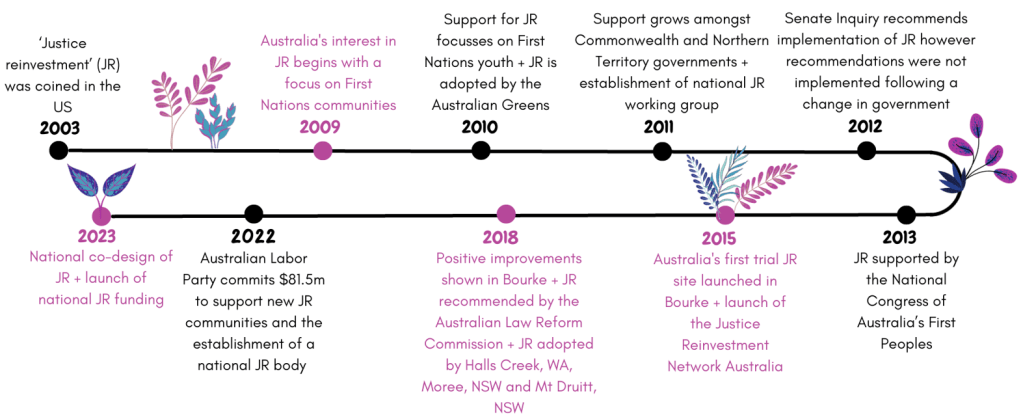
Government plays a critical role in funding and supporting First Nations community leaders to develop local justice reinvestment initiatives, along with implementing critical systems reform to address the systemic drivers of incarceration that sit outside the strengths and power of community.
Australia has a long advocacy history of calls to action upon the Australian government to make a long-term investment in First Nations community-led solutions, including justice reinvestment.
In the early days these calls to action were largely led by lived-experience First Nations Australians along with a large network of advocates, researchers and non-government organisations. In 2009, their calls to support justice reinvestment began to build stronger public momentum with the release of the Australian Human Rights Commission’s Social Justice Report. In 2010, shortly after its release, the Australian Greens Party included justice reinvestment as part of its justice platform.
Over the coming years public and government support steadily grew with the feasibility of justice reinvestment being examined in closer detail within various research and policy publications, including several commissioned by federal, state and territory governments, along with endorsement from the National Congress of Australia’s First Peoples in 2013.
In 2015, this network of supporters for justice reinvestment came together to form the Justice Reinvestment Network Australia, an unincorporated coalition of First Nations community members and justice reinvestment advocates within the government and non-government sectors.
Alongside this, the Aboriginal Legal Service NSW/ACT also launched a strategic initiative to explore justice reinvestment in Bourke, NSW. This work has since evolved into the Maranguka Community Hub (a local community organisation guided by the Bourke Tribal Council) and Just Reinvest NSW (the NSW peak body for justice reinvestment).
In 2018, KPMG conducted an impact assessment of the work of Maranguka with staggering success. They calculated that Maranguka saved the NSW economy $3.1 million, five times their operating costs through impact of the justice system and broader local economy.
At this time, communities and governments from across Australia also begun to develop their own approaches to justice reinvestment. This included the communities of Moree, NSW (with support from Just Reinvest NSW) and Halls Creek, WA (with support from the Halls Creek Shire Council and Social Reinvestment WA). The ACT Government also launched its own approach to justice reinvestment entitled ‘Building Communities, Not Prisons’.
During this same period, the Australian Law Reform Commission’s Pathways to Justice report made multiple recommendations to develop justice reinvestment in Australia, including the establishment of a national body and place-based funding for communities seeking to develop their own justice reinvestment approach.
The Liberal / National Party Government who had requested the review never responded to the recommendations prior to losing office in May 2022. Upon gaining office, the Australian Labor Party made a budget commitment of $81.5 million over four years to expand justice reinvestment as an action under Closing the Gap outcomes 10 and 11.
In 2023, a national design consultation for justice reinvestment was launched aimed at informing the design of a national grants opportunity and independent national body to guide the implementation of their justice reinvestment commitments. In September 2023, the National Justice Reinvestment Program has been launched, with the National Justice Reinvestment Unit set to be established in 2024.
Notwithstanding the enormous progress to date in support of justice reinvestment across Australia, there is still significant work to be done to shift community-government partnerships and public policy towards long-term investment in a community-led justice reinvestment model.
The below page identifies the ongoing policy priorities of the Justice Reinvestment Network Australia in working towards this vision, along with links to the key publications that have been pivotal to the growth of justice reinvestment in Australia to date.
Our policy priorities
Our primary policy priority is to
Progress a national Justice Reinvestment agenda
This agenda prioritises
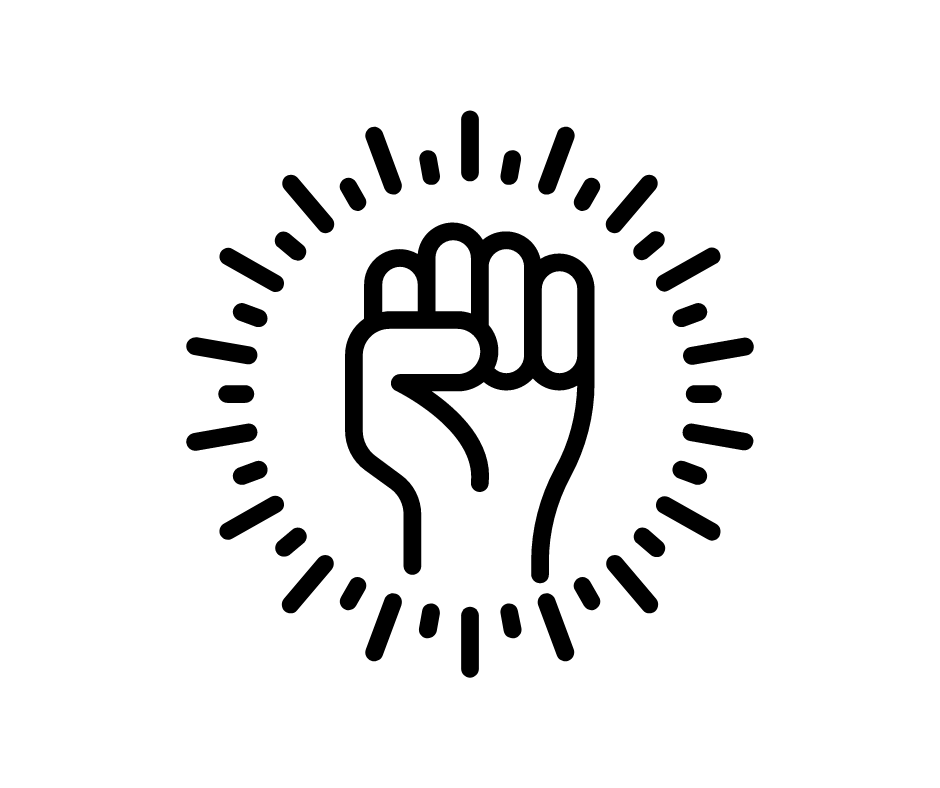
Self-determination
Community and particularly First Nations community leadership and expertise underpinning the design and implementation of Justice Reinvestment.

Long-term funding
Support to communities to identify and access flexible and sustainable funding from different sources.

Systems reform
Enactment of policy and law reforms to the justice system weaknesses and inefficiencies highlighted by the Justice Reinvestment process.
Our submissions
2018 Submission to the Australian Labor Party
Justice Reinvestment Network Australia (2018)
This submission calls on the Australian Labor Party to:
- Enact uniform Commonwealth and State legislation to establish an Australian JR Authority that has a mandate to implement and evaluate JR policy
- Allocate adequate ‘start-up’ funding to establish the Authority
(open access) via JRNA
2019 Submission to the Australian Labor Party
Justice Reinvestment Network Australia (2019)
In response to our initial submission to the Australian Labor Party they asked us to provide further detail on our request for funding and support to justice reinvestment.
This submission addresses the questions raised by making recommendations on the potential roles and functions of the national JR body, along with the budget to implement both reforms over a five year period.
(open access) via JRNA
2022 Submission to the Attorney-General’s Department
Justice Reinvestment Network Australia (2022)
Following the election of the Australian Labor Party, they made a budget commitment of $81.5 million to expand community-led JR and create a national JR body. The Attorney-General’s Department asked further clarifying questions to JRNA on key issues relating to the establishment of the national JR body.
This submission addresses the questions raised by making recommendations on the need for independence, the role of government, the selection process for new JR communities and further information on the potential roles and functions of the national JR body.
(open access) via JRNA
Broader advocacy
Featured reports
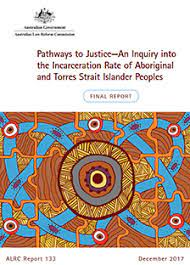
Pathways to Justice. An Inquiry into the Incarceration Rate of Aboriginal and Torres Strait Islander Peoples
The Australian Law Reform Commission (2018)
The Australian Law Reform Commission’s (ALRC) report made multiple recommendations to develop justice reinvestment in Australia. These included:
(Rec 4–1) Commonwealth, state and territory governments should provide support for the establishment of an independent Justice Reinvestment body overseen by a board with First Nations leaders.
(Rec 4–2) Commonwealth, state and territory governments should support justice reinvestment trials initiated in partnership with First Nations communities.
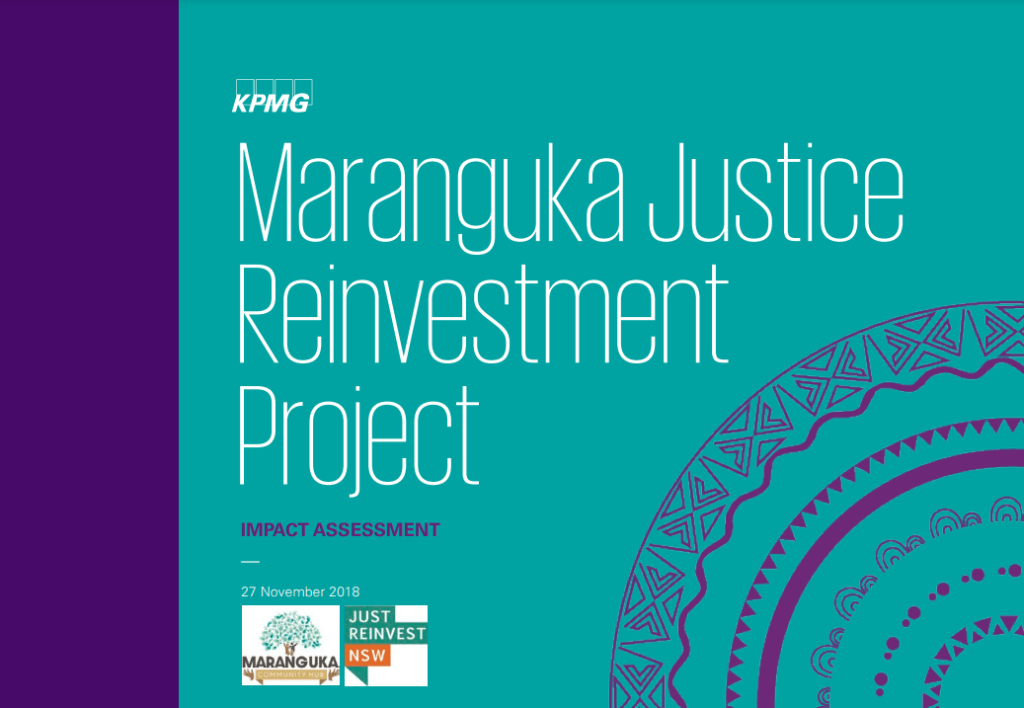
Maranguka Justice Reinvestment Project Impact Assessment
KPMG (2018)
An Impact Assessment of Maranguka’s activities estimated positive improvements in:
- Family strength (including a 23% reduction in police recorded domestic violence)
- Youth development (including a 31% increase in Year 12 retention)
- Adult empowerment (including a 42% reduction in days spent in custody)
They also calculated that Maranguka saved the NSW economy $3.1 million, five times their operating costs through impact of the justice system and broader local economy.

Redefining Reinvestment
Fiona Allison, Just Reinvest NSW (2022)
Over the last decade, Aboriginal communities in NSW have been implementing justice reinvestment (JR) to address Aboriginal over-representation in the justice system. They have returned to its early conceptualisation in the US as a place-based approach that addresses drivers of offending, whilst also emphasising selfdetermination. They define reinvestment, a key element of JR, as a redirection of funds away from more punitive justice responses into localised prevention approaches, but also as a much broader shift in resources and decision-making.
This paper presents an urgent call to action for the NSW Government to invest in JR, framed by Aboriginal definitions of reinvestment. Aboriginal over-representation in NSW continues to rise, alongside increases in NSW Government expenditure on incarceration. Aboriginal communities have been leading JR in NSW for close to a decade now. And while in some areas NSW Government policy aligns with and/or is facilitating reinvestment in NSW, including through the Federal Closing the Gap strategy, additional action is required of government.
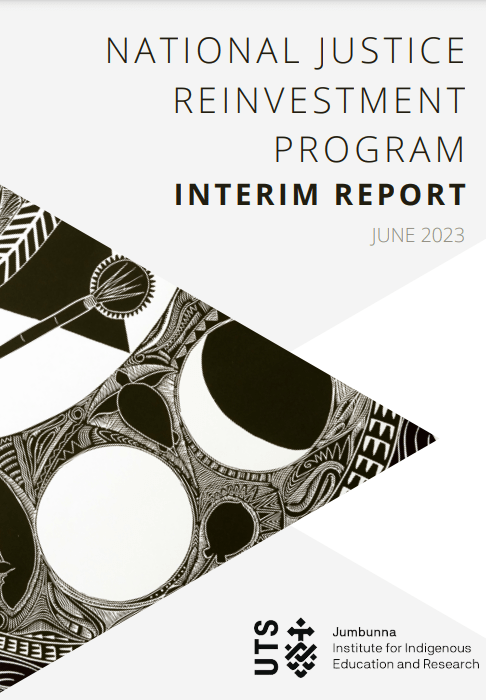
National Justice Reinvestment Program: Interim Report
Jumbunna Institute for Indigenous Education and Research (2022)
This interim report has been prepared to inform design of the grants process and Grant Opportunity Guidelines (GOGs) under the JRP. It draws from a co-design process completed in mid-February to late-May 2023 with Aboriginal and Torres Strait Islander communities and a range of stakeholders and from written submissions made through the Commonwealth Attorney-General Department’s (AGD) online Community Consultation Hub. Further feedback about the grants process, GOGs and on the JRU will be gathered prior to submission of a final report on design of both the unit and the grants process in August 2023. Given these ongoing consultations, it is essential that this interim report informs a preliminary view of the design of the grants process and GOGs.
Video resources
Justice Reinvestment Seminar
Change the Record (2022)
What IS Justice Reinvestment? and how is it changing lives and communities?
Hear from First Nations experts leading community programs in Western Australia, NSW & South Australia:
- Dean Mosquito, a Kija and Juru man and the Executive Officer for Culture and Transformation at Olabud Doogethu in Western Australia
- Deb Moyle, a Ngarrindjeri and Millewa-Mallee woman and Tiraapendi Wodli Program Manager
- Julie Williams, a Gamilaroi woman and the Mt Druitt Community Engagement Officer for Just Reinvest NSW
What does ‘justice reinvestment’ mean to me?
Just Reinvest NSW (2023)
Hear from the community members in Bourke, Moree and Mt Druitt about how they are implementing ‘justice reinvestment’ in their communities.
Justice reinvestment is a way of approaching high rates of incarceration in communities, by building strategies to address issues at a local level that are led by the community and informed by data. These strategies work on bringing about systematic change in care, education, health, policing, corrections and the law.
Redefining Reinvestment
Just Reinvest NSW (2023)
Justice reinvestment is a way of approaching high rates of incarceration in communities, by building strategies to address issues at a local level that are led by the community and informed by data. These strategies work on bringing about systematic change in care, education, health, policing, corrections and the law.
The goal is to create stronger and safer futures through both community-led initiatives and state-wide policy and legislative reform by redirecting funds away from systems that harm people to communities with high rates of contact with the justice system.
Other reports
Ideas for an Open Society: Justice Reinvestment
Susan Tucker and Eric Cadora (2003)
Justice Reinvestment (JR) was coined in the United States of America. Proposed by Susan Tucker and Eric Cadora the idea called for redirecting a portion of the tens of billions of dollars America spends on prisons into addressing underlying causes of crime in high-incarceration neighbourhoods. The originators of Justice Reinvestment advocated ‘taking a geographic approach to public safety that targets money for programs in education, health, job creation, and job training in low-income communities’, and rebuilding human resources and physical infrastructure – schools, healthcare facilities, parks, and public spaces. In order to do this, accountability and funds were to be devolved to local authorities, to seek community level solutions to community level problems.
(open access) via Open Society Institute
Social Justice Report 2009 – Chapter Two: Justice reinvestment
Australian Human Rights Commission (2009)
When something isn’t working, we need to be bold and creative in thinking outside our safe policy parameters for alternative solutions. That is why in this chapter I look to a recent development from the United States, justice reinvestment, as a new approach that may hold the key to unlocking Indigenous Australians from the cycle of crime and escalating imprisonment rates.
Justice reinvestment is a localised criminal justice policy approach that diverts a portion of the funds for imprisonment to local communities where there is a high concentration of offenders. The money that would have been spent on imprisonment is reinvested in programs and services in communities where these issues are most acute in order to address the underlying causes of crime in those communities.
(open access) via Australian Human Rights Commission
Submission to the Inquiry into Access to Justice
Australian Human Rights Commission (2009)
In light of the approach taken by Australian Government’s recent Strategic Framework for Access to Justice in the Federal Civil Justice System, this submission adopts a ‘system wide approach’ that sees access to justice as a ‘key means of promoting social inclusion’. To do this, we put forward ‘justice reinvestment’ as a broad justice reform aimed at increasing Indigenous access to justice, as well as improving social services for disadvantaged Indigenous communities. The concept of justice reinvestment is outlined in Part 4.4 of this submission.
(open access) via Australian Human Rights Commission
A Strategic Review of the New South Wales Juvenile Justice System: Report for the Minister for Juvenile Justice
Peter Murphy et al (2010)
This report reviews the issues faced by the juvenile justice system, identifies its stakeholders and develops options for the future. It recommends a change in thinking, towards justice reinvestment as a cost-effective approach to juvenile justice.
Changes in the juvenile justice system since reforms in the 1990s include a significant increase in the numbers of children and young people under control orders, a large growth in the numbers held on remand, continued overrepresentation of Indigenous young people in the juvenile justice system, and, despite a steady decline, a reoffending rate at approximately 57.3% overall (65.6% for those in custody). Other trends include a reduction in bipartisan support of changes around diversion and detention as a last resort, with an increased focus on ‘law and order’ and ‘getting tough on crime’. Other external drivers include growing community expectations of government, greater focus on whole-of-government approaches and the current financial pressure on the NSW Government.
(open access) via Noetic Solutions Pty Limited
Justice reinvestment: The Green’s plan for a more effective approach to justice
The Australian Greens (2010)
Justice Reinvestment is a smarter, more cost-effective approach to criminal justice which has been successful internationally and will pave the way for safer, stronger Australian communities.
The Australian Greens’ plan includes:
- Investing $10 million over four years in establishing a National Centre for Justice Reinvestment
- Funding a Justice Reinvestment Grants Program worth $50 million over four years.
(open access) via The Australian Greens
Doing Time – Time for Doing – Indigenous youth in the criminal justice system – Chapter 8: Government policy and coordination
House of Representatives Standing Committee on Aboriginal and Torres Strait Islander Affairs, Parliament of Australia (2011)
Recommendation 40 report proposes further investigation into the potential for Justice Reinvestment. This recommendation was accepted by the Commonwealth Government, and the National Justice CEOs established a Working Group which was tasked to develop options for working towards Justice Reinvestment in Australia.
In the report, a substantial number of witnesses emphasised the need to invest more heavily in preventative measures rather than punitive responses to Indigenous offending behaviour through justice reinvestment.
(open access) via Parliament of Australia
Review of the Northern Territory Youth Justice System – Chapter 10: Cost Benefit Analysis
Jodeen Carney et al (2011)
This Review was undertaken on behalf of the Northern Territory Government to identify emerging issues and trends in youth justice and youth offending outlined in the terms of reference. It was not an inquiry established under the Inquiries Act. The Review has identified a number of areas of need that, based on the available evidence, offer the best prospects of delivering reductions in offending and re-offending that in turn will assist government to create safer communities. The Review’s terms of reference (number 5) required a cost benefit analysis—a technical and specialised approach to measuring the impact and effectiveness of crime prevention programs—to be undertaken in relation to proposed strategies and options.
The Review believes that a justice reinvestment approach fits with the principles of prevention and early intervention for young people in the criminal justice system and that the conditions in the Territory are such that the potential benefits of a justice reinvestment approach are significant.
(open access) via Northern Territory Government
Value of a justice reinvestment approach to criminal justice in Australia
Senate Legal and Constitutional Affairs Committee, Parliament of Australia (2012)
The Senate Inquiry into the value of Justice Reinvestment was launched by the Australian Labor Party government, with the support of the Greens. The enquiry was chaired by Western Australian Greens Senator, Penny Wright. This report is divided into eight chapters which explore the underlying drivers behind Australia’s growth in imprisonment rates, explores the methodology and objectives of justice reinvestment, canvasses the benefits and challenges of a justice reinvestment approach for Australia and identifies mechanisms to implement justice reinvestment in Australia.
Drawing from the 131 submissions, the adoption of Justice Reinvestment in Australia was favoured. The Inquiry proposed the Commonwealth Government play a leadership role in establishing and funding a trial alongside collecting and sharing data (recs 1, 2, 5, 7, 8). The Inquiry emphasised that any trial should include at least one remote First Nations community (rec 6). Following a change of Commonwealth Government in 2013, these recommendations have not been progressed until a decade later.
(open access) via Parliament of Australia
Statement to the Expert Mechanism on the Rights of Indigenous Peoples Expert Seminar on Access to Justice for Indigenous Peoples Including Truth and Reconciliation Processes
The National Congress of Australia’s First Peoples (2013)
The National Congress of Australia’s First Peoples launched their justice policy in 2013, which referred to a high level of support among Congress members for Justice Reinvestment trials. The policy singled out pre-trial remand as an opportunity for Justice Reinvestment “because of the immediate cost savings to the justice system of reducing the remand population”. Their support for Justice Reinvestment was later affirmed in the Redfern Statement (2016) which called on the Commonwealth Government to commit to ‘community controlled Justice Reinvestment initiatives that can allow Aboriginal and Torres Strait Islander led solutions to dramatically turn around justice outcomes’.
(open access) via The National Congress of Australia’s First Peoples
Organisations advocating for justice reinvestment
State justice reinvestment bodies and other advocacy bodies can play an important role in elevating the lived experiences and expertise of First Nations communities leading local justice reinvestment approaches. Currently, only three states in Australia have peak bodies for justice reinvestment, however, with government support for justice reinvestment growing and the number of communities implementing justice reinvestment also increasing it is hoped that more state and territory-based justice reinvestment peaks will emerge in the coming years. Further information about the current justice reinvestment peaks and other advocacy bodies advocating for justice reinvestment can be found below:

Just Reinvest NSW (JRNSW)
JRNSW is the peak NSW body for community-led Justice Reinvestment. They support Aboriginal communities to explore and establish justice reinvestment initiatives and advocates for systemic changes that build safer and stronger communities.
They currently act as the backbone organisation for justice reinvestment in the Moree and Mt Druitt communities. They work closely alongside Maranguka, the justice reinvestment backbone organisation for Bourke and are building strategic partnerships with communities in the early stages of building justice reinvestment, including Cowra, Kempsey and Nowra.
They offer a range of tools, policy, practical resources and support for community-led approaches to Justice Reinvestment.
They are also working closely alongside the NSW government and key stakeholders to co-design and implement Australia’s first fiscal mechanism for justice reinvestment.
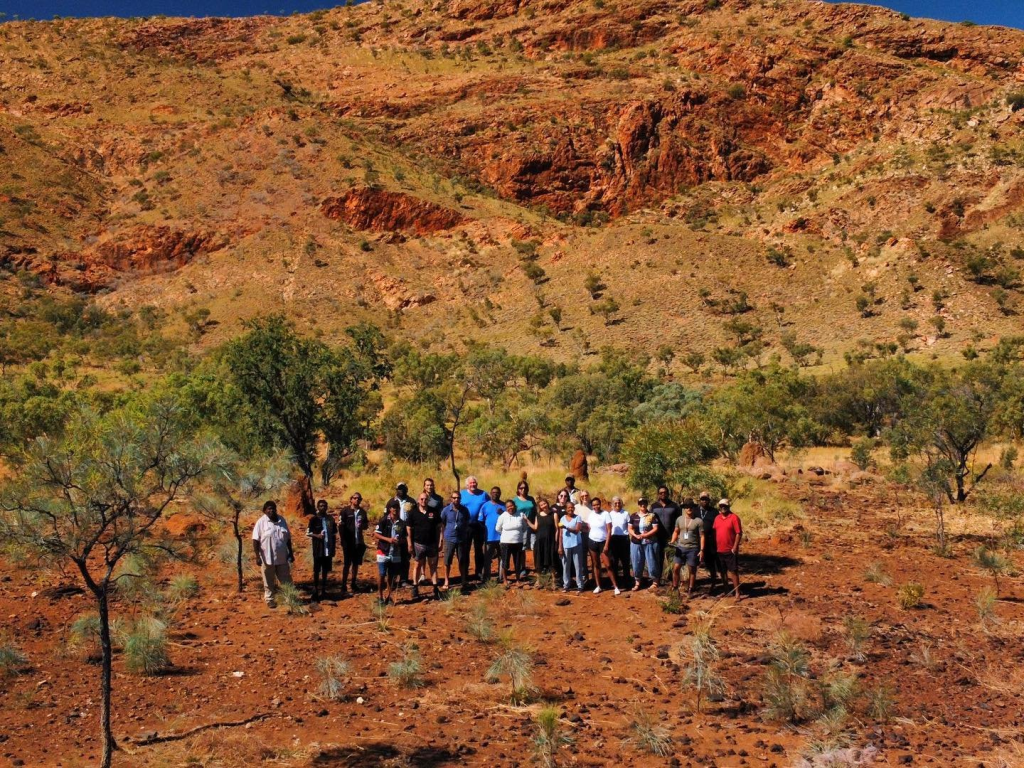
Social Reinvestment WA (SRWA)
SRWA is the peak WA body for community-led Justice Reinvestment. They are a coalition body, led by Aboriginal leaders, the non-profit sector, experts, and lived experience people, working collectively for an effective and connected approach to justice in Western Australia since 2014.
They have a strategic partnership with Olabud Doogethu, the justice reinvestment backbone organisation for Halls Creek and are currently supporting multiple communities in the early stages of building justice reinvestment, including Geraldton, Carnarvon and Port Headland.
They offer a range of tools, policy, practical resources and support for community-led approaches to Justice Reinvestment.
They are also campaigning to the WA government for youth justice reform in WA, including to raise the age of criminal responsibility and to take immediate action on Banksia Hill/Unit 18.

Justice Reinvestment South Australia (JRSA)
JRSA is the peak SA body for community-led Justice Reinvestment. They are a coalition of individuals and organisations from diverse research, policy and community backgrounds who are committed to identifying and implementing approaches to justice that tackle the root causes of crime, reduce offending and improve community cohesion and wellbeing.
Australian Red Cross and JRSA are working in partnership with the Aboriginal community living in Port Adelaide and the western metropolitan area of Adelaide to implement a justice reinvestment initiative known as Tiraapendi Wodli, meaning ‘protecting home’ in Kaurna language.
They are currently working with four more South Australian communities in urban and regional locations to build capacity, governance and a shared and connected vision for justice reinvestment across South Australia.
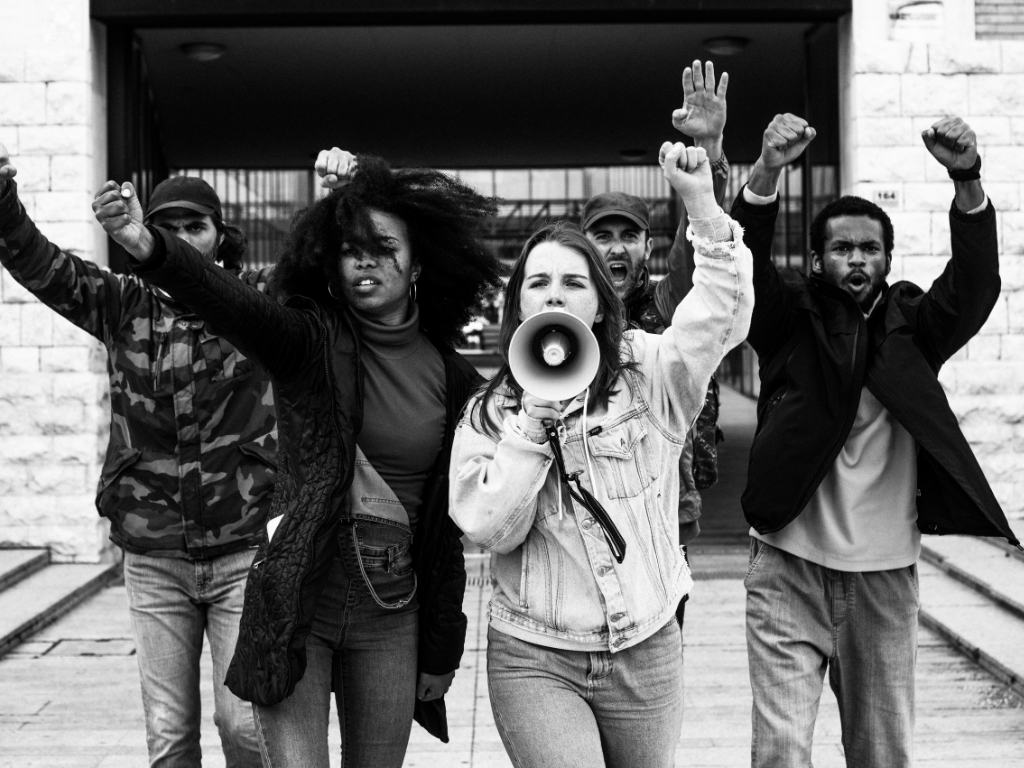
Australians for National Title and Reconciliation (ANTaR): Justice Campaign
ANTaR is a national advocacy organisation dedicated to justice, rights and respect for Australia’s First Nations Peoples.
ANTaR’s Campaigning for Justice toolkit outlines ways to take action; who to write, what to say, and sources to learn more about First Nations’ justice issues including Justice Reinvestment.

The Australian Justice Reinvestment (AJR) Project
The AJR Project is sponsored by the University of New South Wales. It is a national research project investigating the characteristics of Justice Reinvestment and draws together senior researchers across the disciplines of law and criminology to examine justice reinvestment programs in other countries and analyse whether such programs can be developed in Australia.
They offer a range of academic research and resources to build your understanding of Justice Reinvestment.

Change the Record (CTR)
CTR is Australia’s only First Nations led coalition of legal, health and family violence prevention experts. They call on the government to establish a national Justice Reinvestment body and to invest in community-led Justice Reinvestment initiatives.
They provide a range of materials and seminars advocating for Justice Reinvestment.

Justice Reform Initiative
The Justice Reform Initiative is an alliance of people who share long-standing professional experience, lived experience and/or expert knowledge of the justice system, who are further supported by a movement of Australians of goodwill from across the country and across the political spectrum. Their vision for change to the criminal justice system includes support for justice reinvestment.
They provide a comprehensive analysis of imprisonment issues in each jurisdiction and suggested alternatives through their series ‘State of Incarceration’: Insights into Imprisonment in’.
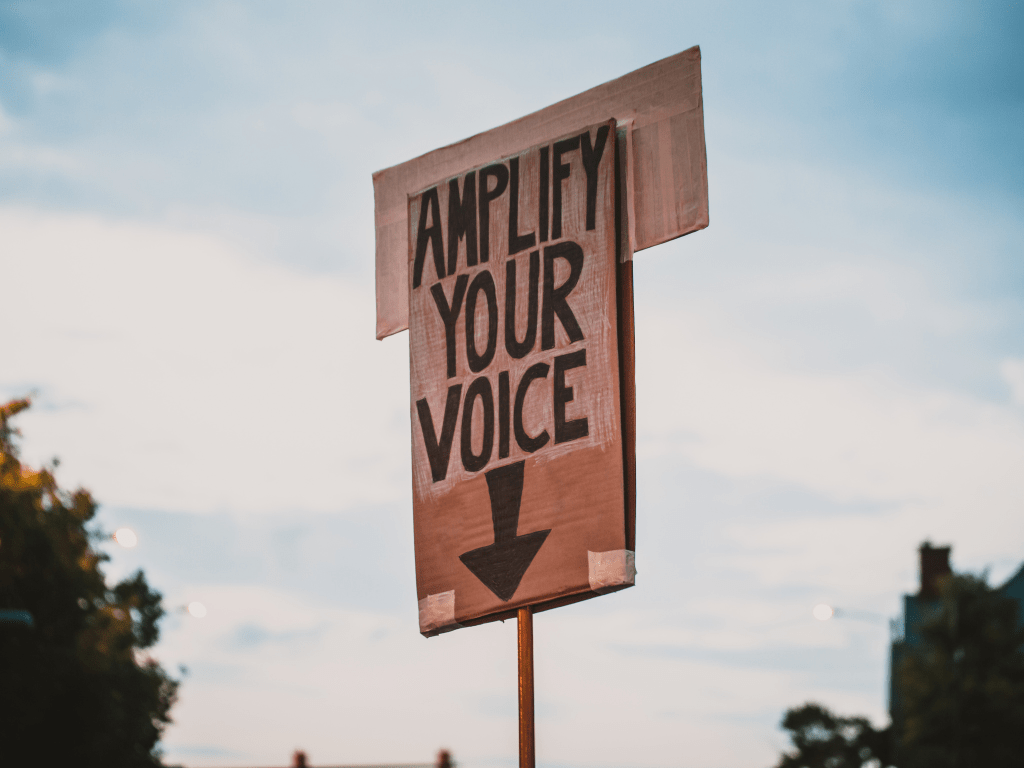
Youth Law: Justice Reinvestment Clearinghouse and Resources
Youthlaw is Victoria’s state-wide free community legal centre for young people under 25 years of age. Youthlaw works to address the legal issues facing young people through legal services, advocacy, law reform and preventative education programs, within a human rights and social justice framework.
They provide a Clearinghouse and resource hub for Justice Reinvestment, including valuable insights from youth.

More information
For further information on the development of justice reinvestment in Australia see the below pages.
